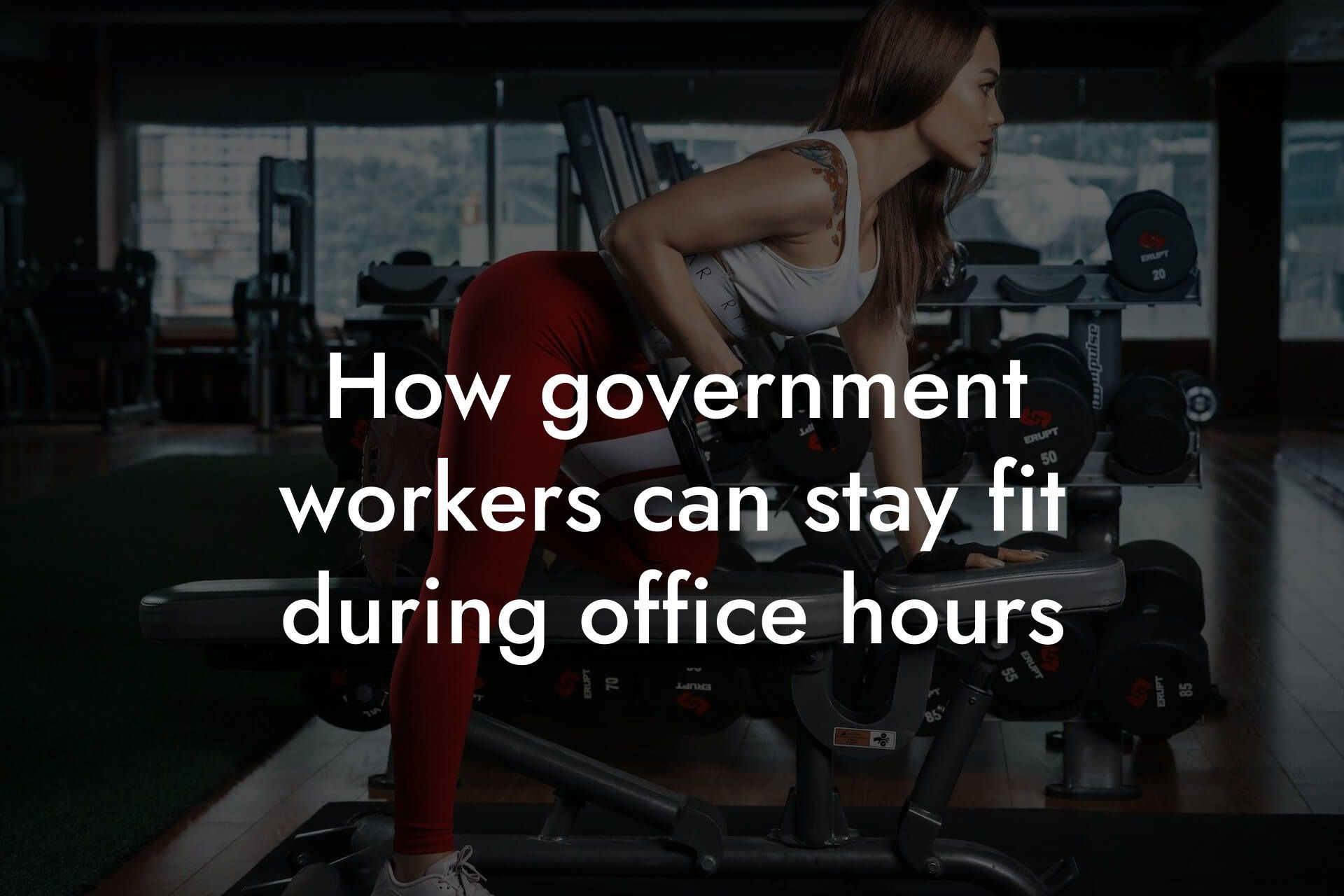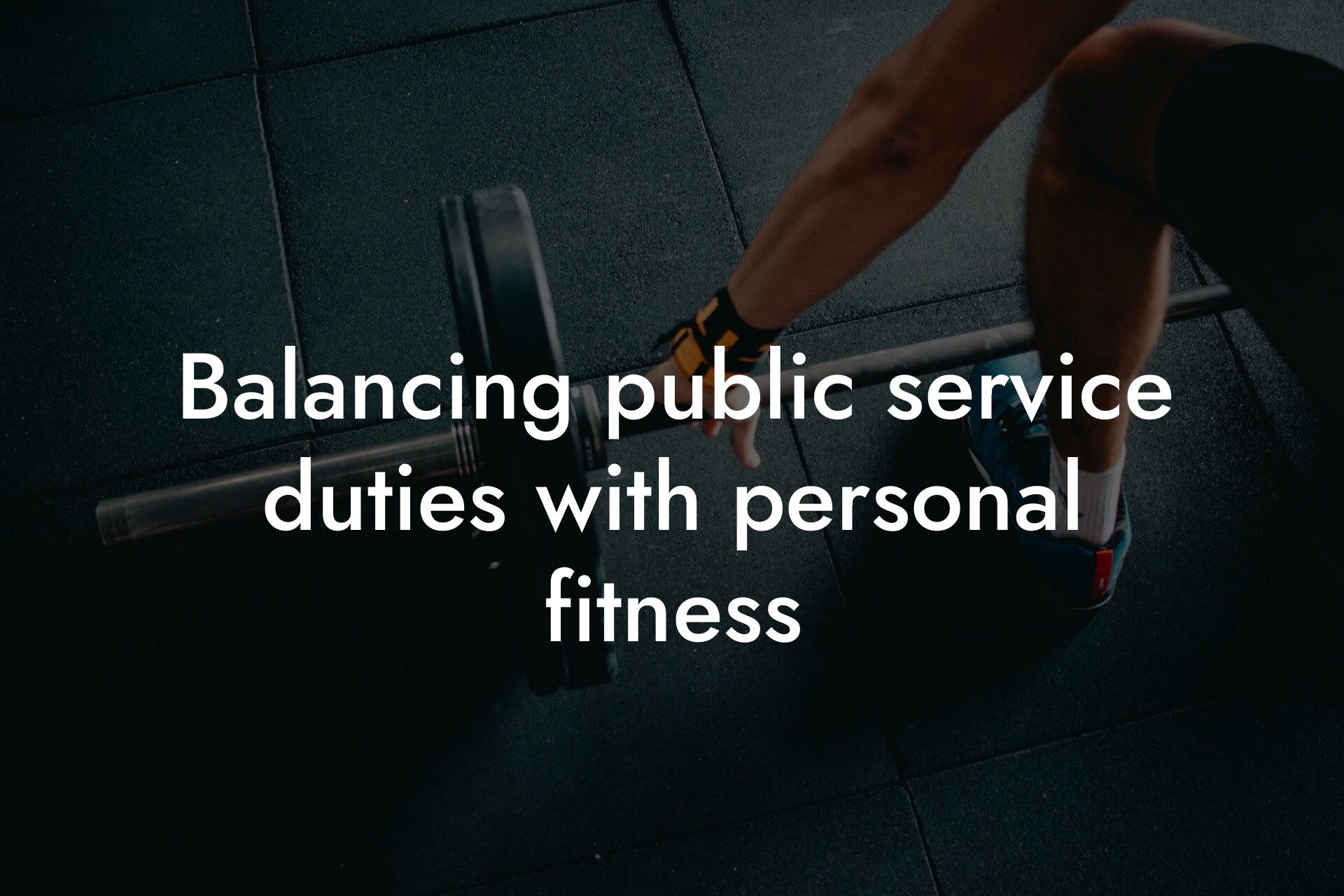As a high-earning professional in public service, managing stress is crucial to maintaining peak performance and overall well-being. Chronic stress can lead to a range of negative effects, including decreased productivity, strained relationships, and a compromised immune system. One effective way to mitigate the impact of stress is through physical fitness. Regular exercise has been shown to reduce stress levels, improve mood, and enhance cognitive function. In this article, we'll explore the importance of physical fitness in managing stress, the unique challenges faced by public service professionals, and provide practical tips for incorporating exercise into your busy schedule.
Table of Contents
- The Impact of Stress on Public Service Professionals
- The Role of Physical Fitness in Stress Management
- The Benefits of Exercise for Public Service Professionals
- Challenges to Incorporating Exercise into a Busy Schedule
- Practical Tips for Incorporating Exercise into Your Schedule
- The Importance of Body Composition Analysis in Physical Fitness
- Frequently Asked Questions
The Impact of Stress on Public Service Professionals
Public service professionals, including law enforcement officers, firefighters, and healthcare workers, face unique stressors that can have a profound impact on their mental and physical health. The high-pressure nature of these roles, combined with the emotional demands of working with vulnerable populations, can lead to chronic stress and burnout. Research has shown that public service professionals are at increased risk of anxiety, depression, and post-traumatic stress disorder (PTSD). Furthermore, the physical demands of these roles can lead to musculoskeletal injuries, sleep disturbances, and cardiovascular disease.
The Role of Physical Fitness in Stress Management
Regular exercise has been shown to have a profound impact on stress management. Physical activity stimulates the production of endorphins, also known as "feel-good" hormones, which can help alleviate symptoms of anxiety and depression. Exercise has also been shown to improve sleep quality, reduce muscle tension, and enhance cognitive function. Furthermore, physical fitness can increase self-efficacy and confidence, allowing individuals to better cope with the demands of their role.
The Benefits of Exercise for Public Service Professionals
In addition to reducing stress and anxiety, regular exercise can have a range of benefits for public service professionals. These include:
Improved physical performance: Regular exercise can improve cardiovascular health, increase strength and endurance, and enhance overall physical function. This can be particularly important for public service professionals who require a high level of physical fitness to perform their duties.
Enhanced mental clarity: Exercise has been shown to improve cognitive function, including concentration, memory, and decision-making skills. This can be particularly important for public service professionals who require quick thinking and sound judgment in high-pressure situations.
Better sleep: Regular exercise can help improve sleep quality, which is essential for physical and mental recovery. This can be particularly important for public service professionals who often work non-traditional hours and may experience sleep disruptions.
Challenges to Incorporating Exercise into a Busy Schedule
One of the biggest challenges to incorporating exercise into a busy schedule is finding the time. Public service professionals often work long hours, including night shifts, weekends, and holidays. Additionally, the physical demands of these roles can leave individuals feeling exhausted, making it difficult to muster the energy to exercise. Furthermore, public service professionals may have limited access to fitness facilities or exercise equipment, particularly in rural or remote areas.
Practical Tips for Incorporating Exercise into Your Schedule
Despite the challenges, there are several practical tips for incorporating exercise into your busy schedule:
Start small: Begin with short, manageable sessions, such as 10-15 minute walks or bodyweight exercises. Gradually increase the duration and intensity as you become more comfortable.
Find activities you enjoy: Engage in physical activities that bring you joy, whether it's running, swimming, or dancing. This will make it more likely that you'll stick to your exercise routine.
Schedule it in: Treat exercise as a non-negotiable part of your daily routine, just like brushing your teeth or taking a shower.
Find a workout buddy: Exercising with a colleague or friend can provide motivation and accountability.
Take advantage of downtime: Use breaks during your shift to engage in short bursts of physical activity, such as stretching or jumping jacks.
The Importance of Body Composition Analysis in Physical Fitness
As a high-earning professional, understanding your body composition is crucial to achieving your physical fitness goals. Body composition analysis can provide valuable insights into your body fat percentage, lean muscle mass, and bone density. This information can be used to tailor your exercise routine, optimize your nutrition, and track your progress over time. At Tano Performance Group, we offer comprehensive body composition analysis using our state-of-the-art DEXA machine. Our expert team will work with you to interpret your results and develop a personalized fitness plan tailored to your unique needs and goals.
Managing stress through physical fitness is essential for public service professionals. Regular exercise can reduce stress and anxiety, improve physical performance, and enhance mental clarity. While incorporating exercise into a busy schedule can be challenging, there are several practical tips for making it a priority. By understanding your body composition and developing a personalized fitness plan, you can take your physical fitness to the next level and perform at your best. Remember, investing in your physical health is investing in your overall well-being and ability to serve others.
Frequently Asked Questions
What is the impact of stress on public service professionals?
Stress can have a significant impact on public service professionals, leading to burnout, decreased productivity, and increased absenteeism. Chronic stress can also contribute to a range of physical and mental health problems, including anxiety, depression, and cardiovascular disease. As a high-earning professional, it's essential to prioritize stress management to maintain your overall well-being and performance.
How does physical fitness help with stress management?
Regular physical activity has been shown to reduce stress levels, improve mood, and enhance overall mental health. Exercise stimulates the production of endorphins, also known as "feel-good" hormones, which can help alleviate symptoms of anxiety and depression. Additionally, physical fitness can improve sleep quality, boost energy levels, and increase self-esteem, all of which can help mitigate the negative effects of stress.
What are some common physical fitness activities that can help with stress management?
There are numerous physical fitness activities that can help with stress management, including cardio exercises like running, cycling, and swimming, as well as strength training, yoga, and Pilates. High-intensity interval training (HIIT) has also been shown to be effective in reducing stress levels. Ultimately, the best activity is one that you enjoy and can commit to regularly.
How often should I engage in physical fitness activities to manage stress?
Aim to engage in physical fitness activities at least three to four times per week, with a minimum of 30 minutes per session. However, even small amounts of physical activity, such as taking a 10-minute walk during your lunch break, can have a positive impact on stress levels.
What is the role of nutrition in managing stress through physical fitness?
A balanced diet that includes plenty of fruits, vegetables, whole grains, lean protein, and healthy fats is essential for supporting physical fitness and managing stress. A well-nourished body is better equipped to handle the physical and mental demands of stress. Additionally, staying hydrated by drinking plenty of water is crucial for maintaining energy levels and overall health.
How can I incorporate physical fitness into my busy schedule as a public service professional?
Find physical fitness activities that can be done in short intervals, such as bodyweight exercises or yoga, which can be done in as little as 10-15 minutes. Schedule physical fitness into your daily planner, just as you would any other important appointment. You can also consider working with a personal trainer or fitness coach to develop a customized fitness plan that fits your busy schedule.
What are some common barriers to physical fitness for public service professionals?
Common barriers to physical fitness for public service professionals include lack of time, energy, and motivation, as well as physical limitations or injuries. Additionally, some individuals may struggle with body image issues or feel self-conscious about their physical appearance. It's essential to identify and address these barriers to develop a physical fitness plan that works for you.
How can I stay motivated to engage in physical fitness activities?
Find a workout buddy or accountability partner to help keep you motivated. Set specific, achievable fitness goals and track your progress. Celebrate your successes, no matter how small, and don't be too hard on yourself if you miss a workout. Remember, every step counts, and even small amounts of physical activity can have a positive impact on stress management.
What are some tips for getting started with physical fitness as a public service professional?
Start small and set realistic goals. Begin with short, manageable workouts and gradually increase the intensity and duration as you become more comfortable. Find a physical fitness activity that you enjoy, and consider working with a personal trainer or fitness coach to develop a customized fitness plan. Don't be afraid to ask for help or support from colleagues, friends, or family members.
How does physical fitness impact bone density?
Regular physical fitness activities, particularly weight-bearing exercises like strength training and high-impact aerobics, can help improve bone density. This is especially important for public service professionals, who may be at risk for osteoporosis or osteopenia due to sedentary lifestyles or other factors.
What is the relationship between physical fitness and body fat percentage?
Regular physical fitness activities, particularly those that incorporate strength training and high-intensity interval training (HIIT), can help reduce body fat percentage. This is because physical fitness activities increase muscle mass, which can help burn more calories at rest, leading to weight loss and improved body composition.
How does physical fitness impact overall physique?
Regular physical fitness activities can help improve overall physique by increasing muscle mass, reducing body fat percentage, and enhancing posture and body alignment. This can lead to improved self-esteem, confidence, and overall mental health.
What are some common myths about physical fitness and stress management?
One common myth is that physical fitness requires a significant amount of time and energy. However, even small amounts of physical activity can have a positive impact on stress management. Another myth is that physical fitness is only for young, fit individuals, when in fact, physical fitness can be adapted to suit individuals of all ages and fitness levels.
How can I track my progress and stay accountable with my physical fitness goals?
Use a fitness tracker or mobile app to track your progress, including workouts, sleep, and nutrition. Take progress photos and measurements regularly. Share your goals and progress with a friend or accountability partner to stay motivated and on track.
What are some resources available to public service professionals for physical fitness and stress management?
Many employers offer employee wellness programs or fitness classes, which can be a great resource for public service professionals. Additionally, there are numerous online resources, including fitness apps, blogs, and social media communities, that provide support and guidance for physical fitness and stress management.
How can I prioritize self-care and physical fitness as a public service professional?
Make self-care and physical fitness a priority by scheduling it into your daily planner. Set realistic goals and boundaries, and learn to say "no" to commitments that may interfere with your self-care and physical fitness goals. Remember, taking care of yourself is essential to maintaining your overall well-being and performance as a public service professional.
What is the long-term impact of physical fitness on stress management for public service professionals?
The long-term impact of physical fitness on stress management for public service professionals can be significant, leading to improved overall health, increased productivity, and enhanced job satisfaction. Regular physical fitness activities can also reduce the risk of chronic diseases, such as heart disease and diabetes, which are common among public service professionals.
How can I incorporate mindfulness and meditation into my physical fitness routine?
Incorporate mindfulness and meditation into your physical fitness routine by starting or ending your workouts with a few minutes of mindfulness exercises, such as deep breathing or body scan meditation. You can also incorporate mindfulness into your daily activities, such as taking a few minutes to focus on your breath during your lunch break.
What are some tips for staying consistent with physical fitness and stress management?
Find a physical fitness activity that you enjoy, and schedule it into your daily planner. Make self-care and physical fitness a priority, and don't be too hard on yourself if you miss a workout. Celebrate your successes, no matter how small, and remember that every step counts.
How can I get support from colleagues and friends for my physical fitness goals?
Share your physical fitness goals with colleagues and friends, and ask for their support and encouragement. Consider starting a workplace fitness challenge or group fitness class to motivate and support one another. You can also join online fitness communities or social media groups to connect with others who share similar goals and interests.
What are some common mistakes to avoid when starting a physical fitness program for stress management?
Common mistakes to avoid when starting a physical fitness program for stress management include setting unrealistic goals, not listening to your body, and pushing yourself too hard. It's essential to start slowly, listen to your body, and prioritize self-care and rest to avoid burnout and injury.
Here are some related articles you might love...
- How government workers can stay fit during office hours
- Nutrition tips for maintaining energy during long meetings
- Balancing public service duties with personal fitness
- How to stay active during legislative sessions
- How DEXA scans can benefit government professionals
- The connection between fitness and public trust
- The role of physical health in community leadership
- The impact of body composition on public service effectiveness
- Quick workouts for government workers on tight schedules
Zak Faulkner
Zak Faulkner is a leading authority in the realm of physical health and body composition analysis, with over 15 years of experience helping professionals optimise their fitness and well-being. As one the experts behind Tano Performance Group, Zak has dedicated his career to providing in-depth, science-backed insights that empower clients to elevate their physical performance and overall health.
With extensive knowledge of DEXA technology, Zak specializes in delivering comprehensive body assessments that offer precise data on body fat, muscle mass, bone density, and overall physique. His expertise enables individuals to make informed decisions and achieve their fitness goals with accuracy and confidence. Zak’s approach is rooted in a deep understanding of human physiology, combined with a passion for helping clients unlock their full potential through personalised strategies.
Over the years, Zak has earned a reputation for his commitment to excellence, precision, and client-focused service. His guidance is trusted by top professionals who demand the best when it comes to their health. Whether advising on fitness programs, nutritional strategies, or long-term wellness plans, Zak Faulkner’s insights are a valuable resource for anyone serious about taking their health and fitness to the next level.
At Tano Performance Group, Zak continues to lead our Content Team revolutionising how professionals approach their physical health, offering unparalleled expertise that drives real results.




